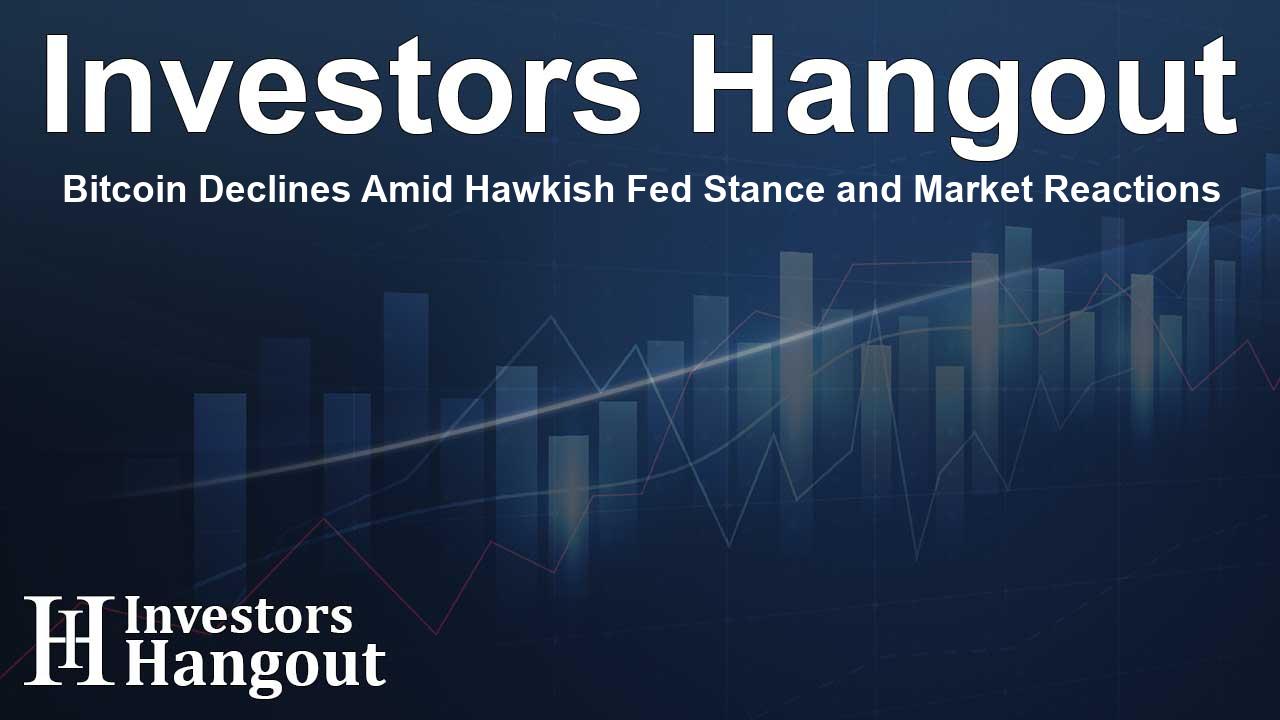Bitcoin Declines Amid Hawkish Fed Stance and Market Reactions

Bitcoin Retreats as Federal Reserve Adjusts Outlook
Bitcoin has experienced a notable decline recently, reflecting a shift in market sentiment influenced by the U.S. Federal Reserve's hawkish outlook. The cryptocurrency slipped further from its recent high as concerns arose regarding tighter monetary conditions, impacting risk appetite among investors.
In comments made by Fed Chair Jerome Powell, he clarified that the central bank would not participate in any government plans to accumulate substantial holdings of Bitcoin. This statement contributed to the weakening sentiment surrounding the world's leading digital currency.
Bitcoin's value fell by 2.6%, reaching $101,153 as of the latest reports. During trading, it briefly dipped below the $100,000 mark—an event that has captured the attention of traders and analysts alike.
Impact of Federal Reserve’s Decisions on Bitcoin
The Federal Reserve's decision to reduce interest rates by 25 basis points did little to bolster the market's confidence. Instead, it signaled a more cautious approach going forward, with predictions indicating only two additional rate cuts in the upcoming years, compared to previous expectations that suggested up to four.
This shift indicates a prolonged period of elevated borrowing costs, which has a dampening effect on speculative assets like cryptocurrencies. Higher interest rates can lead to a decrease in liquidity, making it less appealing for investors to enter or stay in the crypto market.
Investment strategies that favored riskier assets have also taken a hit, as broader market indices reflected a downturn in response to the Fed’s comments. Such market responses are indicative of the interconnected nature between traditional financial policies and the crypto landscape.
Central Bank’s Role and Global Reactions
Powell emphasized that the Fed is not looking to amend laws regarding Bitcoin accumulation, advocating that such matters should be left for Congress to address. His remarks came as discussions arose around the concept of a Strategic Bitcoin Reserve, intended to bolster the U.S. position on digital currencies following recent geopolitical shifts.
Additionally, in a notable policy shift, El Salvador's President Nayib Bukele decided to scale back the national adoption of Bitcoin in the light of securing a significant $1.4 billion loan from the International Monetary Fund (IMF). This adjustment highlights the ongoing struggle between cryptocurrency ambitions and pragmatic economic fundamentals.
While El Salvador has put its Bitcoin ambitions on hold, the historical context remains relevant. The country's Bitcoin stockpile—though diminished in scope—has seen fluctuations in valuation due to the latest crypto market movements.
The Broader Crypto Market Landscape
The ripple effects of Bitcoin’s recent downturn spread throughout the altcoin market. Most cryptocurrencies saw significant declines as traders reacted cautiously to the Fed's latest decisions.
Ethereum, the second-largest cryptocurrency, experienced a decrease of 4.7%, placing its value around $3,684. Solana fell by 2.5%, while Polygon and Cardano faced declines of 6% and more than 4%, respectively. Notably, even meme-based tokens like Dogecoin witnessed a 5.6% drop.
In response to changing regulatory narratives, Hong Kong's securities regulator took steps to grant approvals for four cryptocurrency exchanges. This move reflects the city’s strategic initiative to remain competitive within the growing global digital asset landscape.
Frequently Asked Questions
What caused the recent decline in Bitcoin's price?
The decline is primarily attributed to the U.S. Federal Reserve's hawkish stance on monetary policy, which raised concerns about tighter financial conditions.
How has the Federal Reserve's outlook influenced other cryptocurrencies?
The Fed's comments triggered a sell-off across the crypto market, leading to significant declines in the prices of major cryptocurrencies like Ethereum and XRP.
What are the implications of a Strategic Bitcoin Reserve?
A Strategic Bitcoin Reserve could enhance the legitimacy of Bitcoin as an asset but faces numerous regulatory challenges that may hinder its implementation.
How is El Salvador's relationship with Bitcoin changing?
El Salvador is scaling back its Bitcoin adoption plans, driven by the need to secure a crucial loan from the IMF, reflecting a shift in policy direction.
What are the prospects for the cryptocurrency market given the Fed’s decisions?
In light of the Fed's tightening stance, the cryptocurrency market may experience prolonged volatility as investors reassess their risk strategies.
About The Author
Contact Lucas Young privately here. Or send an email with ATTN: Lucas Young as the subject to contact@investorshangout.com.
About Investors Hangout
Investors Hangout is a leading online stock forum for financial discussion and learning, offering a wide range of free tools and resources. It draws in traders of all levels, who exchange market knowledge, investigate trading tactics, and keep an eye on industry developments in real time. Featuring financial articles, stock message boards, quotes, charts, company profiles, and live news updates. Through cooperative learning and a wealth of informational resources, it helps users from novices creating their first portfolios to experts honing their techniques. Join Investors Hangout today: https://investorshangout.com/
The content of this article is based on factual, publicly available information and does not represent legal, financial, or investment advice. Investors Hangout does not offer financial advice, and the author is not a licensed financial advisor. Consult a qualified advisor before making any financial or investment decisions based on this article. This article should not be considered advice to purchase, sell, or hold any securities or other investments. If any of the material provided here is inaccurate, please contact us for corrections.
